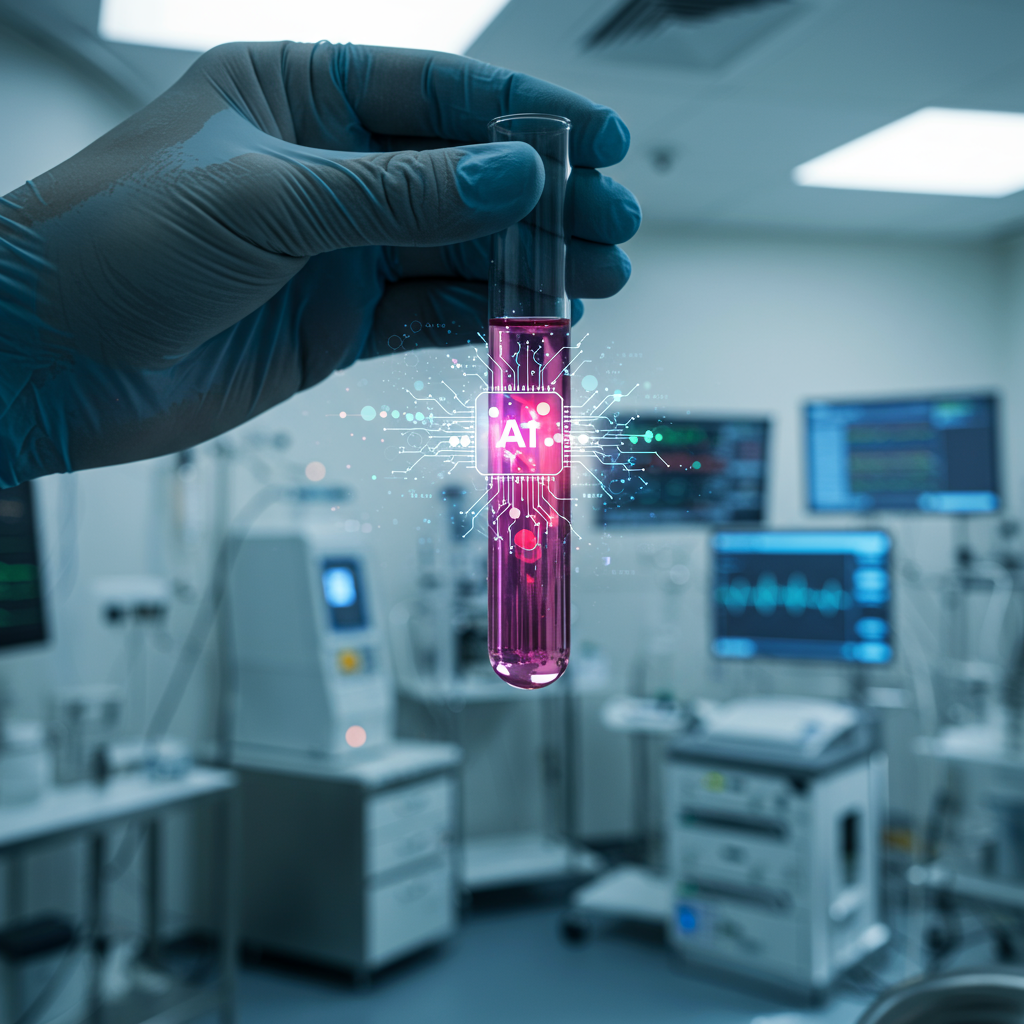The world of medicine is on the cusp of a potential transformation, driven by artificial intelligence. <a href="https://news.quantosei.com/2025/07/07/google-deepmind-has-grand-ambitions-to-cure-all-diseases-with-ai-now-its-gearing-up-for-its-first-human–trials/” title=”DeepMind AI Targets Diseases; Human Trials Are Next”>isomorphic Labs, a company born from Google DeepMind, is making significant strides by preparing to launch human clinical trials for drugs designed using advanced AI. This move represents a critical leap forward in leveraging machine learning to accelerate and improve the notoriously slow and expensive process of discovering new treatments. If successful, these trials could pave the way for a new era in healthcare, offering more effective therapies for a wide range of diseases and dramatically impacting global health.
The Dawn of AI-Driven Drug Discovery
Traditional drug discovery is a long, arduous, and costly endeavor. It often takes over a decade and billions of dollars to bring a single drug to market, with high failure rates, particularly in later-stage human trials. Companies like Isomorphic Labs are working to change this paradigm. Spun out of DeepMind in 2021, Isomorphic Labs was founded with the explicit mission of applying cutting-edge AI to revolutionize pharmaceutical research. Their core belief is that advanced machine learning can analyze complex biological systems more effectively than traditional methods, leading to faster identification of promising drug targets and the design of novel compounds with a higher probability of success.
The foundation of Isomorphic Labs’ work lies deeply within the breakthroughs achieved by Google DeepMind, particularly with the AlphaFold system. AlphaFold initially gained renown for its ability to accurately predict the 3D structures of proteins. This was a monumental scientific achievement, as a protein’s structure dictates its function, and understanding these structures is crucial for identifying how drugs can interact with them. Isomorphic Labs leverages AlphaFold’s evolved technology, which can now model complex interactions between proteins and other molecules like DNA and potential drug candidates. This enhanced capability is fundamental to designing medicines that precisely target specific biological pathways.
From Lab Bench to Human Trials
The decision to initiate human clinical trials marks a pivotal moment for Isomorphic Labs and the broader field of AI in pharma. Moving into human testing is a rigorous validation step that follows extensive preclinical research, including laboratory testing and animal studies. These trials are essential to evaluate the safety, dosage, and effectiveness of a new drug candidate in humans. They represent the final, and often most challenging, hurdle before a drug can be considered for regulatory approval and made available to patients. For an AI-designed drug, reaching this stage is a strong indicator of the company’s confidence in its technology’s ability to generate viable candidates.
Isomorphic Labs is actively preparing for this phase, including staffing up their teams in anticipation of managing clinical operations. The company’s approach combines the expertise of leading machine learning researchers with seasoned pharmaceutical veterans. This hybrid model aims to create a “world-class drug design engine” that not only accelerates the process and reduces costs but significantly boosts the probability of a drug candidate succeeding in trials.
Building the Engine: Partnerships and Funding
To accelerate its ambitious goals, Isomorphic Labs has pursued a dual strategy involving strategic collaborations and developing its own internal pipeline. In 2024, the same year DeepMind released AlphaFold 3, Isomorphic Labs signed major research partnerships with two pharmaceutical giants: Novartis and Eli Lilly. These deals underscore the established industry’s recognition of AI’s potential and their willingness to integrate advanced AI capabilities into their existing drug development programs. Through these collaborations, Isomorphic Labs supports partner companies by applying its AI engine to their specific research needs.
Beyond supporting partners, Isomorphic Labs is also building its own portfolio of drug candidates. The company identifies areas of unmet medical need, such as in oncology (cancer treatment) and immunology, and initiates its own drug design programs. The plan is to advance these internal candidates through early-stage clinical trials before potentially licensing them out to larger pharmaceutical companies for further development and commercialization. This demonstrates a long-term vision to not only be a technology provider but also a creator of novel therapeutic assets.
Significant Investor Confidence
The potential transformative impact of Isomorphic Labs’ work has attracted substantial investment. In April 2025, the company successfully raised $600 million in its first external funding round, led by Thrive Capital. This significant influx of capital provides Isomorphic Labs with the resources needed to scale its research efforts, build out its operational capabilities for clinical trials, and push its AI platform to new levels. The scale of this funding round highlights strong investor confidence in the company’s technology and its potential to disrupt the pharmaceutical industry.
The company’s president, Colin Murdoch, who also serves as Google DeepMind’s chief business officer, has been a key voice in articulating this vision. He emphasizes the dramatic improvements AI can offer over traditional processes. While bringing a drug to market traditionally involves low success rates (sometimes as low as 10% after trials begin) and immense costs, Murdoch believes AI can radically improve these odds. The goal is to reach a point where researchers have a much higher, perhaps near 100%, conviction that a drug designed using their tools will be effective and safe in human trials.
Challenges and the Road Ahead
While the move to human trials is a monumental step, the journey for Isomorphic Labs’ AI-designed drugs is far from over. The clinical trial phase is rigorous and inherently uncertain. Navigating complex regulatory pathways, ensuring patient safety, and definitively demonstrating that their AI-designed drugs are superior or significantly better than existing treatments are critical challenges that lie ahead. The success or failure of these initial human trials will be closely watched by the entire pharmaceutical and biotech community.
Despite these hurdles, the progress made by Isomorphic Labs signifies a major advancement in harnessing the power of AI for medical breakthroughs. The ultimate vision articulated by leaders like DeepMind founder Sir Demis Hassabis, who also oversees Isomorphic Labs, is incredibly ambitious: to potentially reduce the drug discovery timeline from years to months or even weeks, eventually reaching a point where one could conceptually “click a button” after identifying a disease and have the AI rapidly design an effective drug. This level of speed and precision, powered by advanced AI tools, could revolutionize healthcare by providing faster access to novel therapies for pressing global health issues like cancer, cardiovascular disease, and neurodegenerative disorders. The impending human trials are a concrete step towards evaluating if this revolutionary potential can be realized.
Frequently Asked Questions
What are AI-designed drugs and how does Isomorphic Labs create them?
AI-designed drugs are potential new medicines created using artificial intelligence algorithms to analyze biological data, identify disease targets, and propose molecular structures. Isomorphic Labs leverages advanced machine learning, building on DeepMind’s AlphaFold technology, which models protein structures and how they interact with other molecules. This allows their AI platform to predict promising drug candidates faster and more accurately than traditional methods, aiming for higher success rates in development.
What is Isomorphic Labs’ connection to AlphaFold and Google DeepMind?
Isomorphic Labs was founded in 2021 as a spin-off from Google DeepMind, Alphabet’s leading AI research lab. The company was inspired by the groundbreaking success of DeepMind’s AlphaFold system, which revolutionized protein structure prediction. Isomorphic Labs takes the core AI principles and technological advancements from AlphaFold and adapts them specifically for the complex challenges of drug discovery and design. Colin Murdoch serves as president of Isomorphic Labs and Chief Business Officer for DeepMind.
How could AI drug discovery impact the cost and speed of developing new medicines?
Traditional drug development is notoriously slow, expensive, and has high failure rates. AI-driven approaches, like those at Isomorphic Labs, aim to significantly reduce the time and cost involved by accelerating target identification, compound design, and preclinical testing. By potentially increasing the probability of success in clinical trials, AI could lower overall development costs per approved drug and speed up the delivery of much-needed therapies to patients, transforming the efficiency of the pharmaceutical industry.
Conclusion
Alphabet’s Isomorphic Labs stands at a critical juncture as it prepares to move its AI-designed drug candidates into human clinical trials. This development is not just a milestone for a single company but represents a significant validation of artificial intelligence’s potential to fundamentally reshape the pharmaceutical industry. By leveraging advanced machine learning and building on the legacy of AlphaFold, Isomorphic Labs is striving to make drug discovery faster, cheaper, and more effective. While significant challenges remain in the rigorous process of clinical testing and regulatory approval, the prospect of AI-powered drug development reaching human trials signals a tangible step towards a future where AI plays a central role in finding cures and treatments for the world’s most challenging diseases. The outcomes of these initial trials will be crucial in determining the pace of this potentially revolutionary shift in healthcare.




